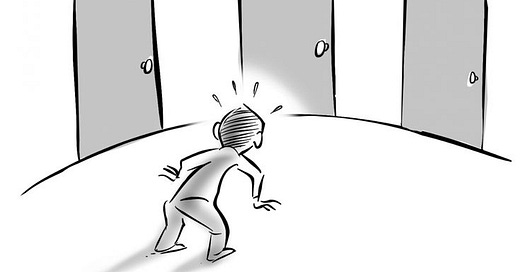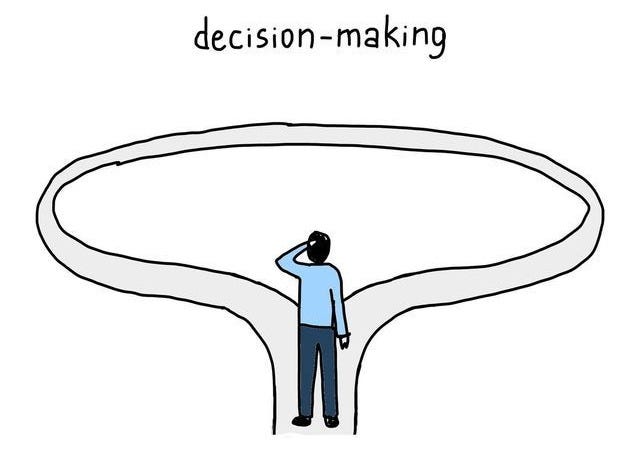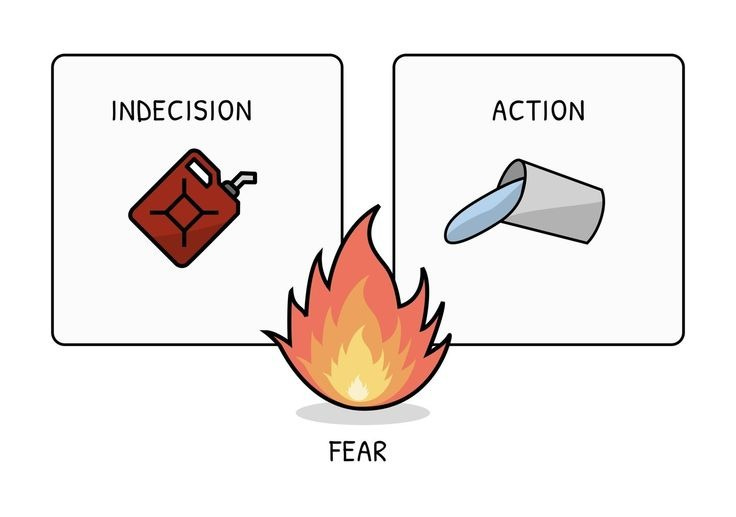ANOTHER DAY
ANOTHER STARTUP INSIGHT
Hey founders, 👋
We’re opening up sponsorship spots in What A Startup — your chance to share your story with a 1000+ startup-savvy audience of founders, operators, investors, and potential early users.
We’ve featured scrappy, pre-seed & seed founders, and bootstrapped indie hackers — and the impact is real.
You don’t need press contacts or big numbers, you just need a story worth telling.
If you want your startup to be seen, remembered, supported (and get the traction) — this might be the most founder-friendly spotlight you’ll find.
Details below:
🔗 WHAT A STARTUP SPONSORSHIP INFORMATIONIndecision is a slow death.
It disguises itself …
as thoughtfulness.
as “being strategic.”
as “waiting for the right time.”
But more often than not, it’s just fear — dressed up as logic.
When you delay decisions, you don’t just lose time.
You lose momentum, energy, confidence, clarity.
And slowly, your startup stops moving.
The truth is:
You already know what to do.
You just don’t want to pay the price!
Clarity comes after action
Building a business means constantly navigating the unknown.
And yet, many founders get trapped by the illusion that there’s a perfect answer out there — if only they research a little more.
Here’s one thing to realize:
Clarity comes after action — not before it.
Action reveals information.
Waiting only amplifies doubt.
The job of a founder isn’t to be right all the time.
It’s to make enough right calls, fast enough, to stay alive and keep learning.
So — how do you actually do that?
Why important decisions feel so hard
Here’s the trap:
All the easy decisions get made early on.
What’s left are the ones that feel heavy, risky, and uncomfortable.
These are decisions where every option has a downside.
You're no longer choosing between good and bad.
You’re choosing between two imperfect outcomes.
Example:
Do you keep selling to the wrong customers and stay afloat?
Or lose 80% of your current revenue to reposition your business for better clients?
Neither feels “safe” — that’s why founders freeze.
But freezing is a decision too — and often the most expensive one.
People often get stuck in these moments of indecision, losing weeks, months, or even years, which stagnates growth.
Speed of growth = speed of decision-making
The speed of your growth is tied to how fast you can make decisions — and your speed of decision-making is tied to how clearly you can think.
If you keep trying to avoid pain altogether, you’ll just delay progress.
The only way to make a hard decision easy is to let life make it for you, which is what most people do.
But letting life decide for you — via stagnation, burnout, or missed opportunities — is a poor way to run a business.
So, if your business feels like it’s not moving, ask yourself:
“What decision am I avoiding right now?”
Because inaction compounds just like action does.
The best founders don’t always make better decisions.
They just make more of them — faster.
Every hard decision has a trade-off
You almost never get something for free.
It’s always trading time, money, risk, or performance.
You can’t escape the trade-off — but you can clarify it.
Ask:
What am I gaining?
What am I giving up?
Which pain am I willing to live with?
Writing this out makes it easier to stop fantasizing and start choosing.
Let pain push you
Most big decisions don’t come from inspiration.
They come from frustration.
You quit your job not because you’re “ready” — but because you can’t take another Monday.
You pivot not because it sounds exciting — but because your current plan stops working.
Discomfort is data.
It’s trying to tell you something.
So, the question is:
How can I make today feel worse so that tomorrow feels better?
Sometimes you need to choose short-term pain to escape long-term stagnation.
Here are a few examples:
Example 1: Shifting customer avatar
Let’s say you’re attracting beginner clients… but you really want to work with advanced ones.
To shift:
You need to change your messaging
Rewrite your lead magnets (maybe write a book)
Raise your prices
But that shift might cost you 80% of your current revenue today.
That’s painful.
But on the other side is a business that feels lighter, clearer, more fun — and more scalable.
Short-term loss → Long-term positioning.
Example 2: Raising prices to solve a bottleneck
Let’s say your product is great, but your team is maxed out.
You can’t scale. You can’t hire. You’re stuck.
Raising prices feels scary.
What if conversion drops?
But:
Higher prices → Fewer customers
Fewer customers → Less support stress
More money per sale → Enough cash to hire better people
It’s a multi-step decision with a painful short-term trade — but a long-term escape hatch.
Example 3: Ad spend vs. ROI fear
Small businesses often stop spending on ads because ROI goes down as scale increases.
But here’s the thing:
$10K ad spend → $100K revenue = 10x ROI
$1M ad spend → $2M revenue = 2x ROI
The second one “looks worse” — but brings in 20x more cash.
Don’t chase % metrics at the expense of total profit.
Focus vs. novelty
One founder had multiple businesses and kept switching between them out of boredom.
But here’s the trade-off:
If you want novelty, you won’t build something big.
If you want something big, you’ll have to get bored.
Once you're clear on what you actually want, decisions get easier — and distractions lose their grip.
MORE STARTUP INSIGHTS AND STORIES
Steal these strategies to make decision easier
Let’s break down the strategies to make clearer, faster decisions — without losing your mind.
1. The 2-door rule
Ask: “Is this decision reversible (2-way door) or permanent (1-way door)?”
2-way doors: Try it → Test it → If it sucks, you can go back/change it.
1-way doors: Think through more, but don’t overanalyze.
Example:
Launching a new landing page? — 2-way.
Changing your whole business model? — 1-way.
Most decisions you face as a startup are 2-way (but your fear makes them feel like 1-way)
They’re testable, reversible, and not that deep!
2. Assign a time budget
Every decision costs brainpower.
So stop treating $10 decisions like $10,000 ones.
Set limits:
Minor impact ($100) → 1–2 mins
Medium impact ($1K) → 10–15 mins
Big impact ($10K+) → 30–60 mins
Critical impact (strategies, hires, etc) → 1 day max
Putting a clock on your thinking reduces overthinking.
You’ll be amazed how much clarity you gain once a clock starts ticking. ⏱️
No more “let me think about it for a week.”
Speed builds trust in yourself.
3. Think in probabilities, not certainties
We’re not fortune tellers.
We’re founders — we work with risk.
Instead of asking “what’s the right answer?”, ask:
What’s the upside if I’m right?
What’s the cost if I’m wrong?
How likely am I to be right?
This is how to make decisions without needing to be sure.
If the upside is big and the downside is recoverable — take the bet.
Business isn’t about avoiding all mistakes.
It’s about placing enough smart bets and adjusting fast.
4. Default to action
The longer you delay a choice, the heavier it feels.
Your default shouldn’t be “wait.”
It should be: “Make the best call I can with what I know now — then move.”
You can always course-correct.
But you can’t steer a parked car.
TL;DR for founders
The hardest decisions involve trade-offs. That’s normal!
Spell out what you’re gaining and losing. Choose the pain you can live with.
Move fast. Momentum is more important than perfection.
Let pain fuel progress. Use it as a signal, not a reason to freeze.
Your future self lives in the compound interest of today’s courageous calls.
Closing thought
Every indecision is still a decision.
When you stall, hesitate, wait for signs, wait for feedback — you’re still choosing.
You’re choosing to stay still.
You’re choosing to let fear run your business.
And that version of you?
That version doesn’t win.
So, be quick to make a call.
Let the pain be worth it.
Let the risk be yours.
Let the story be epic.
I hope this newsletter episode helps you make that decision a little easier.
Share in the comments how you’ve applied any of the strategies above to finally make a decision you had been postponing.
THANKS FOR READING!
- Gracie from What A Startup










![IMAGE] Flowchart to Reduce worry (xpost from r/meditation) : r/GetMotivated IMAGE] Flowchart to Reduce worry (xpost from r/meditation) : r/GetMotivated](https://substackcdn.com/image/fetch/$s_!4llq!,w_1456,c_limit,f_auto,q_auto:good,fl_progressive:steep/https%3A%2F%2Fsubstack-post-media.s3.amazonaws.com%2Fpublic%2Fimages%2F76ccd725-332b-4b11-94f8-dd9cde0cb898_600x513.jpeg)


the writing is sooo good! well, I am always entertained to read your post. whether if I can stop putting off stuff... haha unsure.
Hey! I saw your post pop up on my homepage and wanted to show some support. If you get a chance, I’d really appreciate a little love on my latest newsletter too always happy to boost each other!